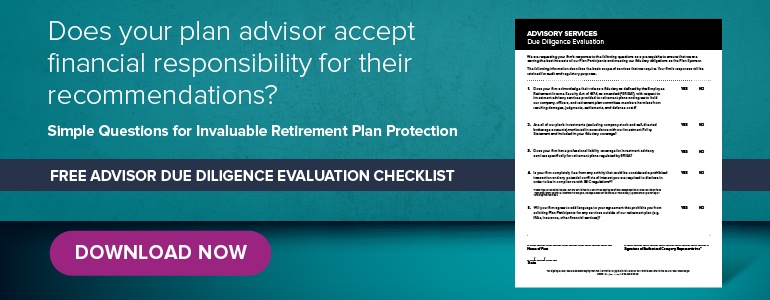Consumer spending behaviors are continuing to shift in 2025, with more consumers seeking flexible payment options to better manage cash flow amid rising costs and economic uncertainty. Buy Now, Pay La...
Is Your Retirement Plan Sponsor ERISA Compliant?
In the recent Supreme Court case of Hughes vs. Northwestern University, current and former plan participants in two of the university’s retirement plans claimed that the academic institution was in breach of its fiduciary duty.
According to the National Law Review, the plaintiffs alleged that they violated their statutory duty of prudence by:
- Failing to monitor and control recordkeeping fees, resulting in unreasonably high costs to plan participants
- Offering mutual funds and annuities in the form of retail share classes that carried higher fees than those charged by otherwise identical share classes of the same investments
- Offering overly complex investment options that were likely to confuse investors
In 2021, the Supreme Court unanimously ruled that the plaintiffs’ arguments were plausible and recommended the claim for further review. In their decision, the Court clarified the standards on which claims against ERISA fiduciaries are judged.
Hughes vs. Northwestern University was one of many pending cases alleging that defined contribution plan fiduciaries imprudently selected or failed to monitor plan investments with excessive fees that underperformed lower-priced investments.
One such was recently filed against a Wisconsin-based consulting group, which provides retirement planning services for many credit unions and other financial institutions.
To ensure your organization’s retirement plan sponsor is compliant with the Employee Retirement Income Security Act (ERISA), it’s critical to understand everyone’s role as it relates to fiduciary responsibility. In this blog post, we’ll take a deep dive into this topic.
Who assumes the role of a retirement plan sponsor?
If your institution offers a 401(k) retirement plan to your employees—whether you know it or not—as the sponsoring institution, you are a retirement plan sponsor.
What is a retirement plan sponsor’s fiduciary responsibility?
As a plan sponsor, you have a fiduciary duty to ensure that your selected plan service providers, including investment advisors and plan recordkeepers, also meet their standards of professional responsibility. It’s also important to determine the fiduciary status of your retirement partners with extreme clarity.
According to the IRS, plan fiduciaries are in a position of trust with respect to the participants and beneficiaries in the plan. A fiduciary’s responsibilities include:
- Acting solely in the interest of the participants and their beneficiaries
- Acting for the exclusive purpose of providing benefits to workers participating in the plan and their beneficiaries, and defraying reasonable expenses of the plan
- Carrying out duties with the care, skill, prudence, and diligence of a prudent person familiar with the matters
- Following the plan documents
- Diversifying plan investments
Without satisfying your oversight obligations regarding these responsibilities, your institution could be held legally liable for the shortcomings of these key plan service providers.
It’s imperative that plan sponsors adopt and implement—with meticulous documentation—a control environment that is designed to clearly demonstrate how they will satisfy their responsibilities owed to plan beneficiaries.
How can retirement plan sponsors meet their fiduciary responsibility?
As a retirement plan sponsor, you have two options for meeting your fiduciary responsibilities:
- Adopting and implementing carefully designed internal controls
- Engaging a partner to ensure that appropriate measures are followed on your behalf, thereby shifting the burden of compliance to your firm’s plan service provider selection and oversight responsibility as plan sponsor.
Mitigate Risk for Your Institution by Partnering with a Retirement Plan Specialist
Many businesses and financial institutions engage a retirement plan advisor with the understanding that, by doing so, they will be mitigating the risk associated with the selection and monitoring of their retirement plan investment option offerings.
Essential to the process of selecting a retirement plan advisor is the ability to determine whether the advisor will be assuming responsibility for performing functions which will result in them being recognized as a “fiduciary” with respect to these functions.
If, for example, you believe that your institution is receiving investment recommendations from your advisor, you should ensure that this understanding is made clear, in writing, between the parties. You should also make clear that you expect the advisor to accept all related responsibilities and liability for the performance of this key plan support function.
Does your institution’s existing retirement plan advisor accept fiduciary responsibility for your plan?
Leadership within your institution should review their organization’s advisory agreements with a fine-tooth comb to determine whether their existing retirement advisor accepts liability, if they protect you as a plan sponsor, and/or if they limit your rights and recourse—or those of your employees and plan beneficiaries—under ERISA.
If you determine that your advisor is not acting as a fiduciary for your plan, then it’s to question whether that advisor is serving your institution’s best interests.
Conclusion
As a retirement plan sponsor for your institution, the standard of professional responsibility has been set for you by ERISA, whether you realize it or not. This professional responsibility can include preparing items such as an RFI for recordkeeping costs, confirming vendor fiduciary commitments, eliminating conflicts of interest, and a variety of other critical hazards.
If you aren’t sure what questions to ask or how to accomplish these tasks, the best course is to get help.
SWBC Retirement Plan Services can help organizations by serving as an advocate to evaluate the current state of their plan and provide specific advice to guide plan success.
Brad Ferguson
Brad is the Chief Executive Officer of SWBC Retirement Plan Services and also serves as a voting member of SWBC’s Investment Committee. He has more than twenty years of experience in providing fiduciary services to plan sponsors in the retirement plan industry and is committed to guiding retirement plan sponsors and providers through the evolving retirement plan landscape.


Let Us Know What You Thought about this Post.
Put your Comment Below.